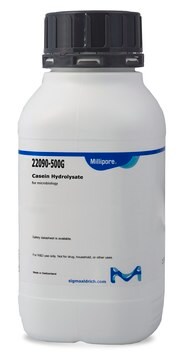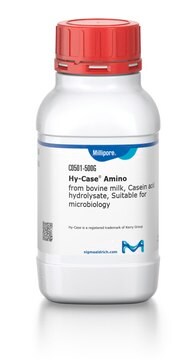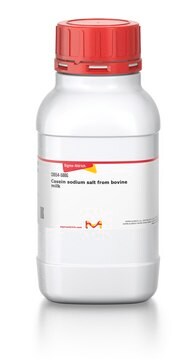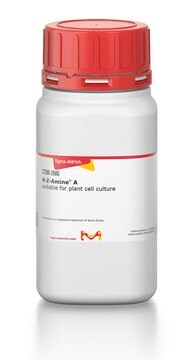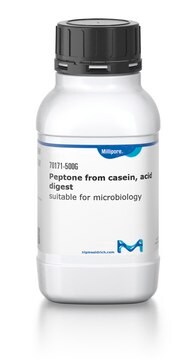A2427
Amicase®
Casein acid hydrolysate, from bovine milk
Synonym(s):
Case amino acids; casein acid hydrolysate
Sign Into View Organizational & Contract Pricing
All Photos(1)
About This Item
Recommended Products
biological source
bovine milk
Quality Level
form
powder
nitrogen analysis
≥9% amino, ≥12% total
loss
≤2% loss on drying
pH
5.6-7.6
application(s)
food and beverages
microbiology
storage temp.
15-25°C
suitability
Bacillus spp.
Enterobacter spp.
Escherichia coli
Saccharomyces spp.
Staphylococcus spp.
Streptomyces spp.
coliforms
Related Categories
General description
Amicase® is prepared by acid digestion of casein. It hasbeen used as a nutrient mixture in peptone agars for avariety of bacteria. It is manufactured under controlled condition by acid hydrolysis of milk protein. Vitamins and other growth promoting compounds are largely destroyed in the process. Hence it is suitable for the preparation of culture media employed in the bacteriological assay of vitamins and antibiotic sensitivity. Casein hydrolysates are used in the formulation of culture media with very high solubility and clarity in solution for the cultivation of heterotrophic microorganisms. It is used in laboratory media and fermentation, especially where high clarity of solution is required.
Application
Amicase® is used as a nutrient mixture in peptone agars for a variety of bacteria, including Bacillus subtilis, Enterobacter aerogenes, Escherichia coli, Saccharomyces cerevisiae, Staphylococcus aureus, Streptomyces pyogenes, and Streptomyces griseus.
Quality
A mixture of free amino acids with virtually no unhydrolyzed peptides. Only minimal inorganic components are present.
Reconstitution
Recommended concentration: 25 g/L
Legal Information
Amicase is a registered trademark of Kerry Group
Storage Class Code
11 - Combustible Solids
WGK
WGK 1
Flash Point(F)
Not applicable
Flash Point(C)
Not applicable
Personal Protective Equipment
dust mask type N95 (US), Eyeshields, Gloves
Choose from one of the most recent versions:
Already Own This Product?
Find documentation for the products that you have recently purchased in the Document Library.
Customers Also Viewed
Yahan Li et al.
Epigenetics, 14(9), 850-876 (2019-05-31)
The use of assisted reproductive technologies (ART) can induce a congenital overgrowth condition in humans and ruminants, namely Beckwith-Wiedemann syndrome (BWS) and large offspring syndrome (LOS), respectively. Shared phenotypes and epigenotypes have been found between BWS and LOS. We have
Our team of scientists has experience in all areas of research including Life Science, Material Science, Chemical Synthesis, Chromatography, Analytical and many others.
Contact Technical Service